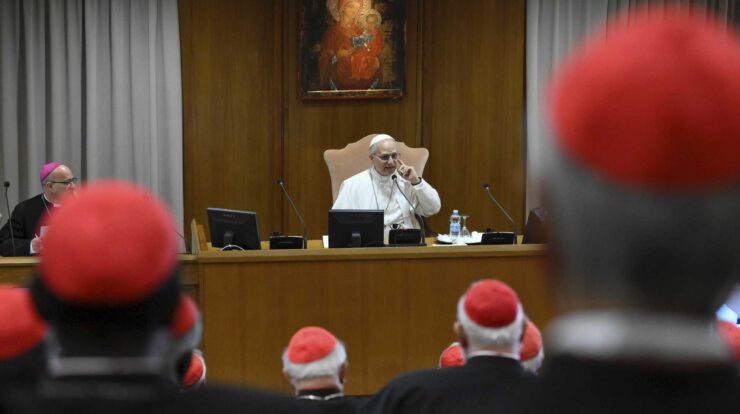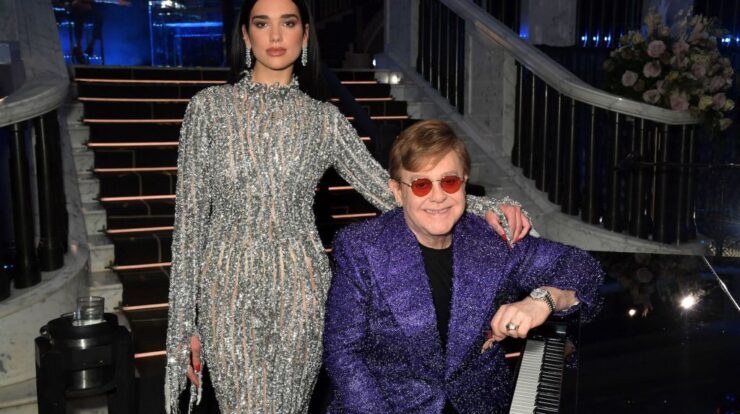
Pope Leo XIV laid out the vision of his papacy Saturday, identifying artificial intelligence as one of the most critical matters facing humanity and vowing to continue in some of the core priorities of Pope Francis.
Related video above: Pope Leo XIV elected as first US pope, sparking celebrations around the world
During his initial official meeting, Leo frequently referenced both Francis and the Argentine Pope’s mission statement from 2013. This underscored his dedication to fostering a more inclusive Catholic Church that pays closer attention to its members and advocates for the “marginalized and disregarded.”
Leo, the first American pope, told the cardinals who elected him that he was fully committed to the reforms of the Second Vatican Council, the 1960s meetings that modernized the church. He identified AI as one of the main issues facing humanity, saying it poses challenges to defending human dignity, justice and labor.
In another hint to his priorities, the Vatican revealed that Leo, a member of the Augustinian religious order, would retain the motto and coat of arms that he had as bishop of Chiclayo, Peru. The motto, “In Illo uno unum,” was pronounced by St. Augustine in a sermon to explain that “although we Christians are many, in the one Christ we are one.”
Identifying with Pope Francis
Leo cited AI when discussing why he chose his name; his namesake, Pope Leo XIII, led the Catholic Church from 1878 to 1903 and established foundational principles for contemporary Catholic social teachings. This was notably accomplished through his issuance of the 1891 encyclical titled “Rerum Novarum,” which tackled issues related to laborers’ rights and capitalism as they emerged during the onset of the industrial era. In this document, the former pontiff condemned both unregulated capitalist practices and government-dominated socialist systems, thereby shaping a distinctively Catholic approach to economics.
In his remarks Saturday, Leo said he identified with his predecessor, who addressed the great social question of the day posed by the industrial revolution in the encyclical.
“In our own day, the church offers everyone the treasury of its social teaching in response to another industrial revolution and to developments in the field of artificial intelligence that pose new challenges for the defence of human dignity, justice and labour,” he said.
Toward the end of his pontificate, Francis became increasingly vocal about the threats to humanity posed by AI and called for an international treaty to regulate it.
He warned that such powerful technology risks turning human relations into mere algorithms. Francis brought his message to the Group of Seven industrialized nations when he addressed their summit last year, insisting AI must remain human-centric so that decisions about when to use weapons or even less-lethal tools always remain made by humans and not machines.
The late Argentine pope also used his 2024 annual peace message to call for an international treaty to ensure AI is developed and used ethically, arguing that a technology lacking human values of compassion, mercy, morality and forgiveness is too perilous to develop unchecked.
In numerous respects, Francis viewed the Chicago-native Augustinian missionary Robert Prevost as a potential successor: In 2014, he transferred him to lead a modest Peruvian diocese, wherePrevost eventually assumed the role of bishop and chairperson for the Peruvian episcopal conference. Later, in 2023, Francis summoned Prevost to Rome to oversee one of the key Vatican departments responsible for evaluating candidates for bishop positions.
During the address presented in Italian within the Vatican’s synod hall—not the Apostolic Palace—Leo frequently mentioned both Francis and the sorrow surrounding his passing. He showcased Francis’ inaugural mission from 2013, titled “The Joy of the Gospel,” as guidance for himself, indicating an intention to uphold many of Francis’ key focuses moving forward.
He highlighted Francis’ emphasis on the church’s missionary character and the importance of making its governance more collaborative. He also pointed out the necessity of listening to the faithful, particularly their genuine and comprehensive expressions such as devotional practices. Referring once again to Francis’ mission statement from 2013, Leo underscored the imperative for the Church to show “compassionate concern” towards those who are marginalized and left behind, and to courageously converse with today’s society.
A quick conclave
As he walked in, Leo was met with a standing ovation and proceeded to read from his pre-prepared remarks, glancing up infrequently. Similarly, even during his initial appearance to the public at the loggia of St. Peter’s Basilica on Thursday evening, Leo delivered lines from a carefully handwritten speech that had likely been composed either prior to his significant election or within an hour following it. However, he appeared more at ease when spontaneously uttering brief phrases in Spanish.
Prevost was chosen as the 267th pope on Thursday after only four ballots during the papal conclave, which was remarkably quick considering this was both the biggest and most internationally varied gathering ever. Many of the cardinals were unfamiliar with each other prior to their arrival in Rome.
Cardinals mentioned that Prevost didn’t deliver significant speeches during the preliminary talks before the conclave, and they entered the conclave adhering to the customary prohibition against selecting an American Pope due to the country’s global dominance. However,Prevost was familiar to many cardinals because of his extensive tenure as a missionary and later as a bishop in Peru, along with his role heading the Vatican’s office for bishops since 2023.
It was mentioned that he left a mark in more intimate settings where English served as the primary mode of conversation within a gathering of 133 cardinals hailing from 70 different nations.
Madagascar Cardinal Désiré Tsarahazana informed journalists on Saturday that on the last vote count, Prevost obtained more than 100 votes. This indicates an unprecedented majority, significantly surpassing the required two-thirds, which equates to 89 votes, needed for election.
READ MORE:
Pope Leo XIV states that AI poses a major challenge for humanity, mirroring Pope Francis’ views.
CHECK OUT WPTZ:
Stay updated with the newest Plattsburgh and Burlington news each day. Check out the top headline stories and access the most recent weather updates online at your convenience.






